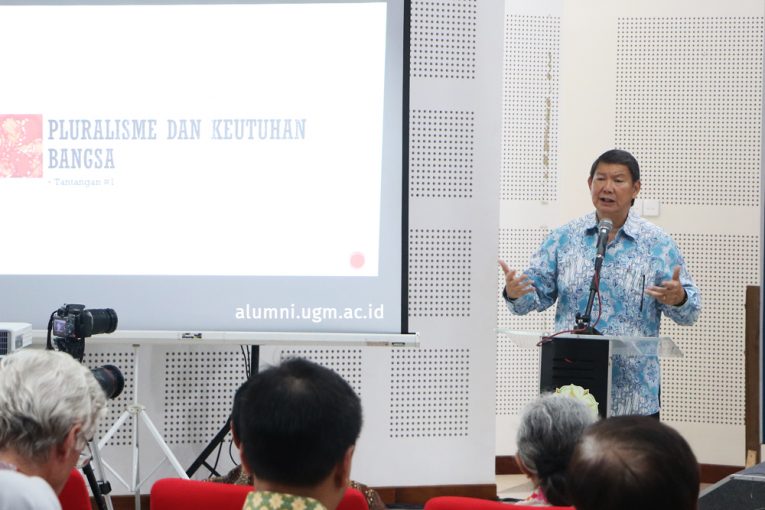
“The people of Indonesia should be proud because we’ve been given Pancasila, which was born from the wise thought of the founders of the nation, as a binder of the differences of ethnicity, religion, language, and culture,” said Hashim Djojohadikusumo while giving a public lecture with the theme ‘Pluarisme dan Pembangungan Karakter Bangsa (Pluasrism and National Character Building)’ in front of the faculty members of the Faculty of Cultural Sciences (FIB) Universitas Gadjah Mada (UGM), Wednesday (18/4).
According to Hashim, Pancasila is not only seen as the basis of the law and the guidance of the state, but also as a national heritage that must be maintained and guarded for the existence of Indonesia. Pancasila contains many historical and humanist values that teach how important it is to stay united in the pluralistic society of Indonesia.
Furthermore, Hashim considered Pancasila is able to function as a fusion tool of the caste division paradigm between the minority and majority groups that has always been a sensitive issue. Hashim exemplifies how the Javanese people can wisely back down and accept the Indonesian as the national unity language, whereas it is known that Javanese is the largest population in the country.
“Pancasila was present in the midst of diversity, born from a long historical process, its goal is to unite us, with our differences, into one Indonesian nation,” he said.
The youngest son of the economic guru across the ages, Prof. Soemitro Hadidjojokusumo sees the importance of maintaining the value of Pancasila in the midst of modernization and globalization. Pancasila can be the solution to the nation’s challenge to the potential disintegration that is being crowded into the conversation.
Indonesian nation should be able to reflect on historical facts in the past where some countries in the world experienced disintegrations because they could not manage the internal conflict properly.
Hashim took the example of the Soviet Union, a former superpower country that has now disappeared from the world map and has split into 15 countries. The same thing happened in Yugoslavia, one of the most influential countries in the world, is now split into several new countries due to horizontal conflicts caused by uncontrolled cultural, religious, and language friction.
“Don’t see Pancasila as irrelevant to the advancement of current development, Pancasila is very relevant. As a matter of fact, the split that has happened in Yugoslavia and The Soviet Union may just happen in Indonesia, if the spirit and values of Pancasila are gone from this country,” he said.
Not only to give a public lecture at the Soegondo Room FIB, Hashim Djojohadikusumo’s presence at UGM was also in the framework of signing the MoU between his social foundation, Yayasan Ashari Djojohadikusumo (YAD), with Universitas Gadjah Mada.
Hashim is known to be a figure that is well known for his concern for education in Indonesia. Through YAD, Hashim has a lot of contribution in the form of educational facilities and scholarships to UGM academicians. One of YAD’s contribution is by establishing Margono FIB UGM Building, which is taken from his grandfather’s name Prof. Margono Djojohadikusumo.
Hashim is also one of the figures who was awarded “Sahabat UGM” by Universitas Gadjah Mada for his services and work so far in supporting the improvement of the education quality at UGM. [Eggy/Farah]
